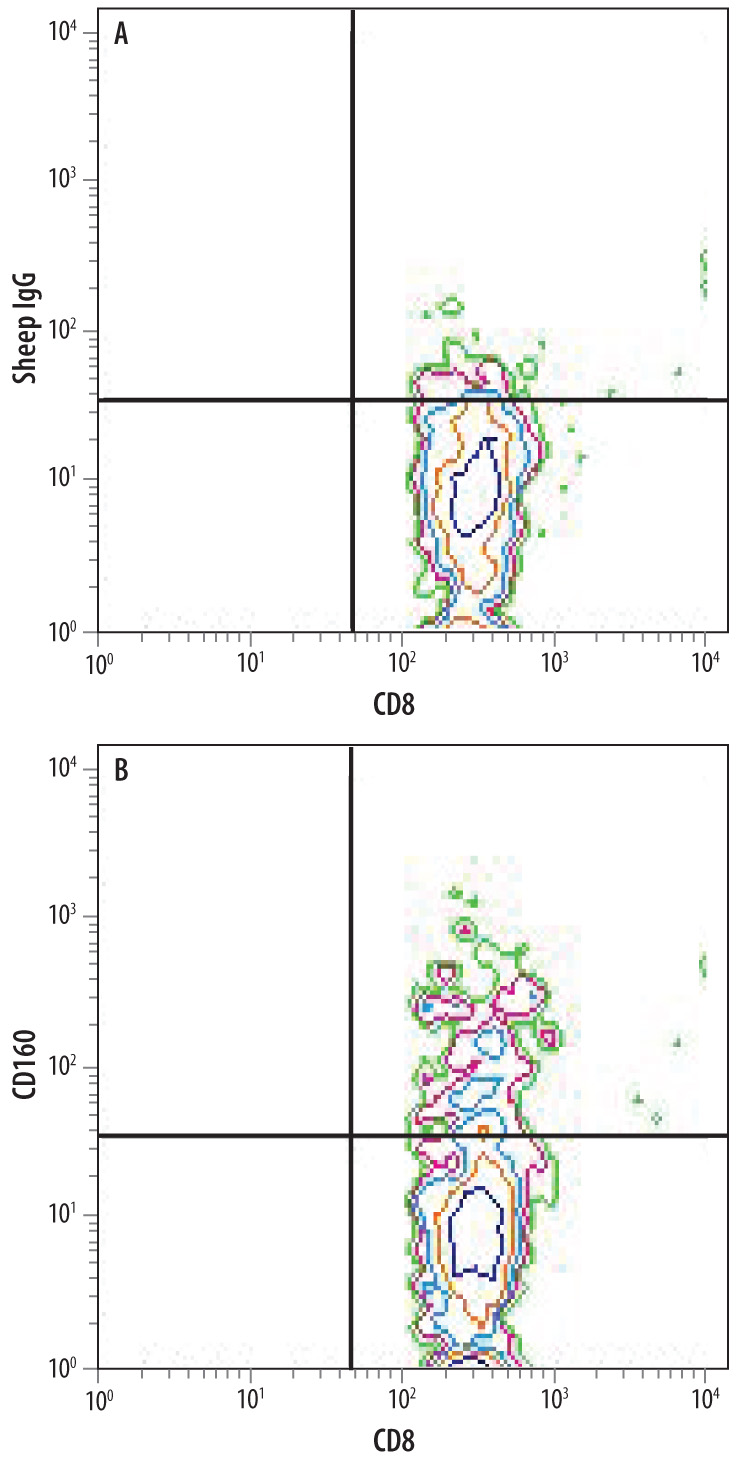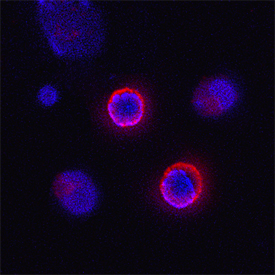Mouse CD160 Antibody Summary
Gly28-Ser160
Accession # AAH21596
Applications
Please Note: Optimal dilutions should be determined by each laboratory for each application. General Protocols are available in the Technical Information section on our website.
Scientific Data
 View Larger
View Larger
Detection of CD160 in Mouse Splenocytes by Flow Cytometry. Mouse splenocytes (CD8-gated) stimulated with LPS for 3 hours were stained with Sheep Anti-Mouse CD160 Antigen Affinity-purified Polyclonal Antibody (Catalog # AF3899) followed by Phycoerythrin-conjugated Anti-Sheep IgG Secondary Antibody (Catalog # F0126) and Rat Anti-Mouse CD8a APC-conjugated Monoclonal Antibody (Catalog # FAB116A). Quadrant markers were set based on control antibody staining (Catalog # 5-001-A).
 View Larger
View Larger
CD160 in Mouse Splenocytes. CD160 was detected in immersion fixed mouse CD8+ splenocytes using Sheep Anti-Mouse CD160 Antigen Affinity-purified Polyclonal Antibody (Catalog # AF3899) at 15 µg/mL for 3 hours at room temperature. Cells were stained using the NorthernLights™ 557-conjugated Anti-Sheep IgG Secondary Antibody (red; Catalog # NL010) and counterstained with DAPI (blue). Specific staining was localized to plasma membranes. View our protocol for Fluorescent ICC Staining of Non-adherent Cells.
Reconstitution Calculator
Preparation and Storage
- 12 months from date of receipt, -20 to -70 °C as supplied.
- 1 month, 2 to 8 °C under sterile conditions after reconstitution.
- 6 months, -20 to -70 °C under sterile conditions after reconstitution.
Background: CD160
‑CD160 (also Natural killer cell receptor BY55) is a 16 kDa (predicted) member of the Ig superfamily (1 ‑ 4). In mouse, it is expressed principally on nonmyeloid hematopoietic cells. These include CD3+ NK1.1 cells, CD8+ TEM and TCM T cells, CD8 alpha + IELs, NKT cells, CD8-gamma δ TCR T cells, and vascular endothelial cells (1, 5‑7). Mouse CD160 has been identified as a 20-21 kDa GPI-linked glycoprotein (4, 5). It is synthesized as a preproprotein that is 185 amino acids (aa) in length. The precursor contains a 27 aa signal sequence, a 133 aa mature molecule that shows one 98 aa V-type Ig-like domain (aa 28-125), and a 25 aa prosegment that is cleaved to generate a GPI-linkage at Ser160. Mouse GPI-linked CD160 is known to be cleaved by phospholipase C, and this generates a 40 kDa (presumably dimeric) band in SDS-PAGE (5). One alternative splice form for mouse CD160 is reported that appears to show a deletion of aa 137-180. This may generate a soluble molecule (5; GenBank Accession # NP_001156969). Mature mouse CD160 shares 63% and 88% aa identity with human and rat CD160, respectively.
In mouse, CD160 is reported to bind to bind to HVEM/TNFRSF14, and both classical and non‑classical MHC Class I molecules (5, 8). MHC‑I proteins recognized by CD160 include Dd, Kb, Qa-1b and CD1d (5). Upon engagement, the effects of CD160 ligation appear to be context dependent. When expressed on endothelial cells, CD160 binding to human HLA-G1 initiates apoptosis, and thus impacts angiogenesis (6). When expressed on NK1.1 cells, mouse CD160 ligation alone has no effect; when combined with NK1.1 antigen stimulation, CD160 decreases NK cell IFN-gamma secretion. Relative to cytotoxicity, NK cell activity is positively correlated with the presence of CD160 (5).
- Cai, G. & G.J. Freeman (2009) Immunol. Rev. 229:244.
- del Rio, M.L. et al. (2010) J. Leukoc. Biol. 87:223.
- Maiza, H. et al. (1993) J. Exp. Med. 178:1121.
- Anumanthan, A. et al. (1998) J. Immunol. 161:2780.
- Maeda, M. et al. (2005) J. Immunol. 175:4426.
- Fons, P. et al. (2006) Blood 108:2608.
- Tsujimura, K. et al. (2006) Immunol. Lett. 48:106.
- Cheung, T.C. et al. (2009) Proc. Natl. Acad. Sci USA 106:6244.
Product Datasheets
FAQs
No product specific FAQs exist for this product, however you may
View all Antibody FAQsReviews for Mouse CD160 Antibody
There are currently no reviews for this product. Be the first to review Mouse CD160 Antibody and earn rewards!
Have you used Mouse CD160 Antibody?
Submit a review and receive an Amazon gift card.
$25/€18/£15/$25CAN/¥75 Yuan/¥2500 Yen for a review with an image
$10/€7/£6/$10 CAD/¥70 Yuan/¥1110 Yen for a review without an image


